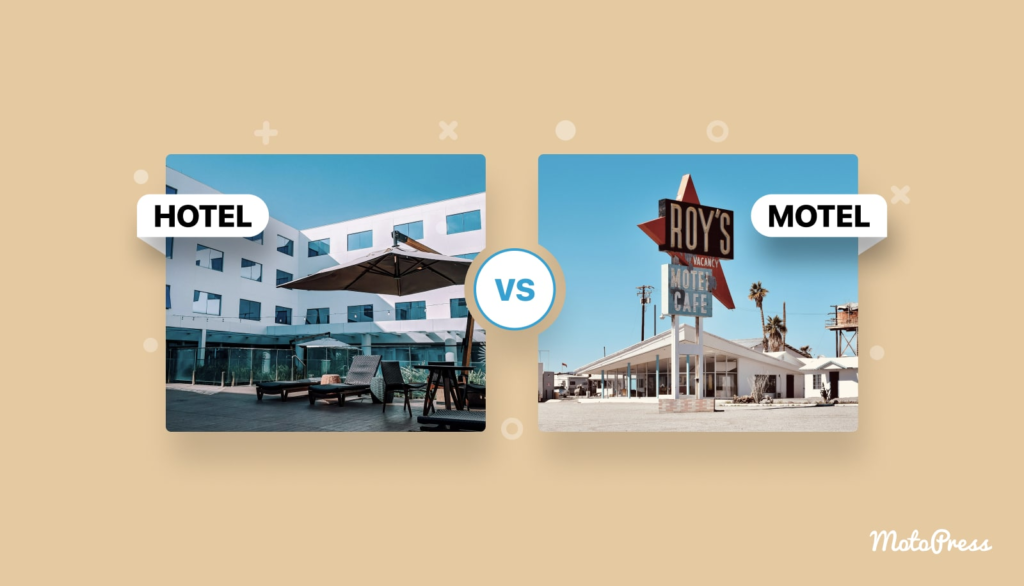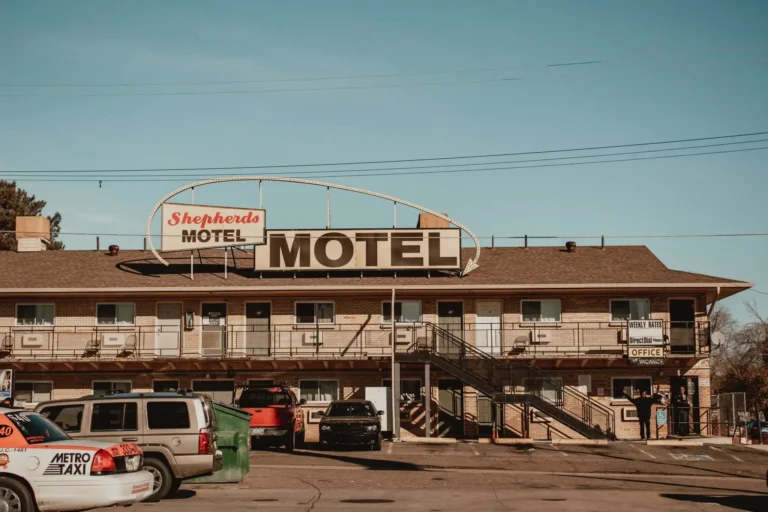Hotels and motels might seem the same, but they’re actually quite different. Whether you’re planning a road trip or booking a weekend getaway, knowing the difference can help you choose the right place to stay. In this guide, we’ll explore the real differences in a simple, easy-to-understand way.
What’s the Difference Between a Hotel and a Motel?
At first glance, hotels and motels might look like they do the same thing — they both offer a place to sleep. But when you dig deeper, you’ll find that they have very different purposes, locations, and amenities.
A hotel is usually a larger building found in cities or busy areas, offering multiple floors and a wide range of services like restaurants, gyms, conference rooms, and concierge support. A motel, on the other hand, is typically a smaller roadside property built for travelers, often with rooms that open directly to the parking lot. Motels are more basic and are designed for short stays, especially for people driving long distances.
What is a Hotel?
A hotel is a commercial establishment that provides lodging, meals, and other guest services. They can range from budget-friendly to luxury five-star resorts. Most hotels are multi-story buildings located in city centers, tourist destinations, or near airports. Inside, you’ll often find a front desk, elevators, multiple floors, and services like daily housekeeping, room service, fitness centers, swimming pools, and restaurants.
Hotels cater to many different types of travelers — business professionals, vacationers, families, and international tourists. Because of this, they offer more amenities, customer service, and security than motels. Many hotels are part of a global chain, such as Marriott, Hilton, or Hyatt, and they often come with loyalty programs and booking flexibility.
What is a Motel?
A motel (short for “motor hotel”) was originally designed to serve people traveling by car. Most motels are single or double-story buildings where the guest rooms face the parking lot. This design makes it easy for travelers to park their cars right outside their rooms, which is especially convenient for road trips and quick overnight stays.

Motels are typically located along highways, in smaller towns, or on the outskirts of cities. They provide basic accommodations, usually without fancy extras. You might get free Wi-Fi and a simple breakfast, but don’t expect a full-service restaurant or concierge service. Motels are ideal for short stays and are often cheaper than hotels, which is why they are still popular among road-trippers, truck drivers, and travelers looking to save money.
Where Did Motels Come From?
Motels first appeared in the 1920s in the United States, during the rise of automobile travel. As more Americans began taking road trips, there was a growing need for convenient, affordable places to stay overnight. Motels popped up along popular highways and routes, offering travelers easy parking, low prices, and no need to walk through lobbies or use elevators. By the 1950s and 1960s, motels became a symbol of American road culture.
Are Motels Cheaper Than Hotels?
Yes, motels are usually cheaper than hotels. This is one of the main reasons why people choose them. Motels don’t offer the same range of services or fancy amenities, so their operating costs are lower — and they pass those savings on to the guest. If you’re traveling on a budget or just need a place to sleep for one night, a motel is often the most affordable option.
However, cheaper doesn’t always mean worse. Many motels are clean, comfortable, and convenient — especially if you’re not planning to spend much time in your room.
Do Motels Have Room Service?
In most cases, motels do not offer room service. Since motels are built for quick stays and basic needs, they often don’t have on-site restaurants or full kitchens. Some may offer vending machines, free coffee, or a simple continental breakfast, but you shouldn’t expect a full menu or food delivered to your door.
Hotels, especially mid-range and luxury ones, usually have in-room dining options. This is a major difference if you’re someone who enjoys meals delivered straight to your room.
Key Features of Hotels
Hotels offer a wide range of services and features that make them a good choice for long stays, vacations, and business trips. Here are some of the top features you can expect in most hotels:
- 24/7 front desk and concierge service
- Daily housekeeping
- On-site dining (restaurants, cafes, room service)
- Swimming pools, fitness centers, and spas
- Conference rooms and business centers
- Security staff and surveillance
- Multiple floors with elevator access
- Loyalty programs and reward points
These features make hotels more luxurious and suitable for guests who want comfort, service, and a full experience.
Key Features of Motels
While motels are more basic, they still offer key features that make them a great choice for travelers, especially those driving long distances:
- Easy parking, usually right outside your room
- Ground-floor rooms with direct outdoor access
- Low cost and simple booking
- Ideal for short stays
- Often pet-friendly
- Located near highways or interstates
- Some may offer free breakfast and Wi-Fi
Motels are all about convenience and value. They’re designed for travelers who need a clean, safe place to rest without the extra frills.
Which One Should You Choose?
The decision between a hotel and a motel depends on your travel needs. Are you going on a luxury vacation or just passing through a small town on a road trip? Do you need services like room service and fitness centers, or are you just looking for a place to sleep for one night?

Hotels are the better option for comfort, amenities, and long-term stays. Motels are great if you’re looking for something affordable and quick with easy access to your car.
Let’s break it down even further.
Long Stay vs Short Stay
If you’re staying for more than a few nights, especially in a city or tourist spot, a hotel is usually the better choice. You’ll get housekeeping, dining options, laundry service, and often a better location.
Motels are better for overnight stops or short stays. If you’re driving cross-country and just need to crash for the night, a motel gives you everything you need without the higher cost.
Do Hotels Have Better Security?
Yes, hotels usually have better security. Most hotels have security cameras, electronic keycard access, and staff working around the clock. Some also have on-site security guards or locked entrances after hours.
Motels, due to their open design and direct room access, may not offer the same level of security. While many are perfectly safe, guests should always check reviews and ratings before booking.
Are Hotels and Motels in the Same Places?
Not really. Hotels are found in cities, downtown areas, near airports, and in vacation destinations. They are designed to serve tourists, business travelers, and guests looking to enjoy the area.
Motels are commonly found along highways, in small towns, or near interstates. They are built to be quick stops for people on the go, especially drivers covering long distances.
Fun Facts About Hotels and Motels
Did you know the world’s oldest hotel is over 1,300 years old and still running in Japan? Or that the word “motel” was first used in 1925? Fun fact: The world’s largest hotel, the First World Hotel in Malaysia, has over 7,000 rooms! On the flip side, many classic American motels became iconic in movies and TV shows, from Alfred Hitchcock’s “Psycho” to Pixar’s “Cars.” These places are more than just places to sleep — they’re part of our travel history.
The Bottom Line
Hotels and motels both offer a place to stay, but they serve different purposes. If you want comfort, services, and a longer stay, a hotel is your best bet. If you’re looking for convenience, savings, and a quick night’s rest, go with a motel. Both have their own strengths depending on what you need. Now that you know the real difference, you’ll be able to choose the right one every time you travel.


